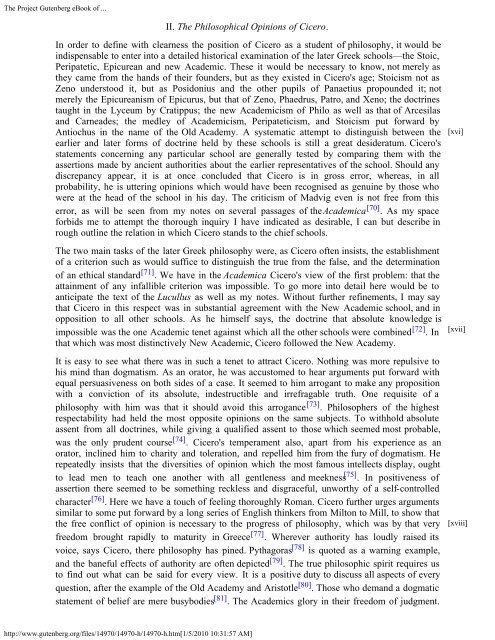academica of cicero. - 912 Freedom Library
academica of cicero. - 912 Freedom Library
academica of cicero. - 912 Freedom Library
You also want an ePaper? Increase the reach of your titles
YUMPU automatically turns print PDFs into web optimized ePapers that Google loves.
The Project Gutenberg eBook <strong>of</strong> ...<br />
II. The Philosophical Opinions <strong>of</strong> Cicero.<br />
In order to define with clearness the position <strong>of</strong> Cicero as a student <strong>of</strong> philosophy, it would be<br />
indispensable to enter into a detailed historical examination <strong>of</strong> the later Greek schools—the Stoic,<br />
Peripatetic, Epicurean and new Academic. These it would be necessary to know, not merely as<br />
they came from the hands <strong>of</strong> their founders, but as they existed in Cicero's age; Stoicism not as<br />
Zeno understood it, but as Posidonius and the other pupils <strong>of</strong> Panaetius propounded it; not<br />
merely the Epicureanism <strong>of</strong> Epicurus, but that <strong>of</strong> Zeno, Phaedrus, Patro, and Xeno; the doctrines<br />
taught in the Lyceum by Cratippus; the new Academicism <strong>of</strong> Philo as well as that <strong>of</strong> Arcesilas<br />
and Carneades; the medley <strong>of</strong> Academicism, Peripateticism, and Stoicism put forward by<br />
Antiochus in the name <strong>of</strong> the Old Academy. A systematic attempt to distinguish between the<br />
earlier and later forms <strong>of</strong> doctrine held by these schools is still a great desideratum. Cicero's<br />
statements concerning any particular school are generally tested by comparing them with the<br />
assertions made by ancient authorities about the earlier representatives <strong>of</strong> the school. Should any<br />
discrepancy appear, it is at once concluded that Cicero is in gross error, whereas, in all<br />
probability, he is uttering opinions which would have been recognised as genuine by those who<br />
were at the head <strong>of</strong> the school in his day. The criticism <strong>of</strong> Madvig even is not free from this<br />
error, as will be seen from my notes on several passages <strong>of</strong> the Academica [70] . As my space<br />
forbids me to attempt the thorough inquiry I have indicated as desirable, I can but describe in<br />
rough outline the relation in which Cicero stands to the chief schools.<br />
The two main tasks <strong>of</strong> the later Greek philosophy were, as Cicero <strong>of</strong>ten insists, the establishment<br />
<strong>of</strong> a criterion such as would suffice to distinguish the true from the false, and the determination<br />
<strong>of</strong> an ethical standard [71] . We have in the Academica Cicero's view <strong>of</strong> the first problem: that the<br />
attainment <strong>of</strong> any infallible criterion was impossible. To go more into detail here would be to<br />
anticipate the text <strong>of</strong> the Lucullus as well as my notes. Without further refinements, I may say<br />
that Cicero in this respect was in substantial agreement with the New Academic school, and in<br />
opposition to all other schools. As he himself says, the doctrine that absolute knowledge is<br />
impossible was the one Academic tenet against which all the other schools were combined [72] . In<br />
that which was most distinctively New Academic, Cicero followed the New Academy.<br />
It is easy to see what there was in such a tenet to attract Cicero. Nothing was more repulsive to<br />
his mind than dogmatism. As an orator, he was accustomed to hear arguments put forward with<br />
equal persuasiveness on both sides <strong>of</strong> a case. It seemed to him arrogant to make any proposition<br />
with a conviction <strong>of</strong> its absolute, indestructible and irrefragable truth. One requisite <strong>of</strong> a<br />
philosophy with him was that it should avoid this arrogance [73] . Philosophers <strong>of</strong> the highest<br />
respectability had held the most opposite opinions on the same subjects. To withhold absolute<br />
assent from all doctrines, while giving a qualified assent to those which seemed most probable,<br />
was the only prudent course [74] . Cicero's temperament also, apart from his experience as an<br />
orator, inclined him to charity and toleration, and repelled him from the fury <strong>of</strong> dogmatism. He<br />
repeatedly insists that the diversities <strong>of</strong> opinion which the most famous intellects display, ought<br />
to lead men to teach one another with all gentleness and meekness [75] . In positiveness <strong>of</strong><br />
assertion there seemed to be something reckless and disgraceful, unworthy <strong>of</strong> a self-controlled<br />
character [76] . Here we have a touch <strong>of</strong> feeling thoroughly Roman. Cicero further urges arguments<br />
similar to some put forward by a long series <strong>of</strong> English thinkers from Milton to Mill, to show that<br />
the free conflict <strong>of</strong> opinion is necessary to the progress <strong>of</strong> philosophy, which was by that very<br />
freedom brought rapidly to maturity in Greece [77] . Wherever authority has loudly raised its<br />
voice, says Cicero, there philosophy has pined. Pythagoras [78] is quoted as a warning example,<br />
and the baneful effects <strong>of</strong> authority are <strong>of</strong>ten depicted [79] . The true philosophic spirit requires us<br />
to find out what can be said for every view. It is a positive duty to discuss all aspects <strong>of</strong> every<br />
question, after the example <strong>of</strong> the Old Academy and Aristotle [80] . Those who demand a dogmatic<br />
statement <strong>of</strong> belief are mere busybodies [81] . The Academics glory in their freedom <strong>of</strong> judgment.<br />
http://www.gutenberg.org/files/14970/14970-h/14970-h.htm[1/5/2010 10:31:57 AM]<br />
[xvi]<br />
[xvii]<br />
[xviii]















